Baker Academic and Brazos Press Ethics Collection (19 Vols.)
Digital Logos Edition
Overview
Discover resources to help you think through the Christian walk with works on ethics from Baker Academic and Brazos Press. Christians have historically been concerned with right belief and right action. With works by noted ethicists such as David Clyde Jones, Craig Boyd, and Samuel Wells, their insights are yours to draw on as you consider various ethical issues and topics.
With Logos, these resources are made to work for you. Scripture references are tagged, allowing you to view your favorite Bible translations while reading along. Important theological concepts link to dictionaries, encyclopedias, and a wealth of other information. Do better Bible study with Logos.
Save even more when you buy the Baker Academic and Brazos Press Ethics and Spiritual Formation Collection, which contains both the Baker Academic and Brazos Press Ethics Collection and the Baker Academic and Brazos Press Spiritual Formation Collection at an additional discount!

Key Features
- Explore various topics in ethics
- Learn from respected ethicists
- Do in-depth research with tagged resources
Product Details
- Title: Baker Academic and Brazos Press Ethics Collection
- Publisher: Baker Academic and Brazos Press
- Volumes: 19
- Pages: 4,504
- Resource Type: Monographs
- Topic: Ethics
Individual Titles
- Biblical Christian Ethics by David Clyde Jones
- A Shared Morality: A Narrative Defense of Natural Law Ethics by Craig A. Boyd
- Be Not Afraid: Facing Fear with Faith by Samuel Wells
- Becoming Friends: Worship, Justice, and the Practice of Christian Friendship by Paul J. Wadell
- Death and Afterlife: A Theological Introduction by Terence Nichols
- Generous Spaciousness: Responding to Gay Christians in the Church by Wendy VanderWal-Gritter
- Glittering Vices: A New Look at the Seven Deadly Sins and Their Remedies by Rebecca Konyndyk DeYoung
- Hope in Troubled Times: A New Vision for Conflicting Global Crisis by Bob Goudzwaard, Mark Vander Vennen, and David Van Heemst
- Improvisation: The Drama of Christian Ethics by Samuel Wells
- Just War as Christian Discipleship: Recentering the Tradition in the Church rather than the State by Daniel M. Bell Jr.
- Loves Me, Loves Me Not: The Ethics of Unrequited Love by Laura A. Smit
- Real Sex: The Naked Truth about Chastity by Lauren F. Winner
- Rethinking Christ and Culture: A Post-Christendom Perspective by Craig A. Carter
- Reviving Evangelical Ethics: The Promises and Pitfalls of Classic Models of Morality by Wyndy Corbin Reuschling
- Secret Faith in the Public Square: An Argument for the Concealment of the Christian Faith by Jonathan Malesic
- The Meaning of Sex: Christian Ethics and the Moral Life by Dennis P. Hollinger
- The Politics of the Cross: The Theology and Social Ethics of John Howard Yoder by Craig A. Carter
- This Mortal Flesh: Incarnation and Bioethics by Brent Waters
- Vulnerable Communion: A Theology of Disability and Hospitality by Thomas E. Reynolds
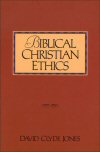
Biblical Christian Ethics
- Author: David Clyde Jones
- Publisher: Baker Academic
- Publication Date: 1994
- Pages: 224
After examining what Scripture teaches about the goal and motive of the Christian life, the author addresses moral dilemmas, human-life issues, sexuality, economic justice, and truthfulness.
“Jones’ volume can be studied with a good deal of profit, and let me add, ‘by all means, do study it.’”
—Henry Krabbendam (Westminster Theological Journal)
David Clyde Jones is professor emeritus of systematic theology and ethics at Covenant Theological Seminary.
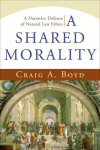
A Shared Morality: A Narrative Defense of Natural Law Ethics
- Author: Craig A. Boyd
- Publisher: Brazos Press
- Publication Date: 2009
- Pages: 272
Morality based on natural law has a long tradition, and has proven to be quite resilient in the face of numerous attacks and challenges over the years. Those challenges are no less serious today, which leads one to ask if natural law is still a viable foundation for ethics.
Craig Boyd provides a contemporary defense of natural law theory against modern challenges from the arenas of science, religion, culture, and philosophy. In his analysis, he defends many of the classical elements of natural law, but also takes into account the contributions of scientific discoveries about human nature. He concludes that natural law is a necessary but not sufficient basis for ethics that must be accompanied by a theory of virtue.
Craig A. Boyd’s A Shared Morality makes an important contribution to the literature on natural law and the virtues. Boyd offers a cogent and historically grounded account of why common human morality is best conceived along lines provided by the natural law tradition. He offers a clear normative thesis but is fair-minded to opposing positions and aware of the need for further work on the topic. This book will be especially interesting to those interested in issues of relativism, moral reasoning, and cross-cultural morality. It should be read by ethicists, theologians, and anyone concerned about the moral foundations of human rights and the common good.
—Stephen J. Pope, author, The Ethics of Aquinas
Natural law advocates and virtue 'theorists' have largely ignored one another. In this book, Boyd develops a constructive engagement between these positions to which I hope philosophers and theologians will attend. If they are like me, they will learn much from this book.
—Stanley Hauerwas, author, The Peaceable Kingdom: A Primer in Christian Ethics
Craig A. Boyd has developed a contemporary version of natural law ethics, drawing more on sociobiology and current concepts of nature than on Aristotelian metaphysics. Yet he follows Aquinas on the good life by tying natural law to virtue ethics, which in turn leads to a divine command theory of moral obligation. Add this to his vigorous response to analytic moral philosophy and to scientific and postmodern criticisms, and the result is a splendid treatment of contemporary philosophical ethics. The exposition is both clear and competent, his research thorough, and the argument persuasive. It's a book I strongly recommend for teacher and student alike.
—Arthur Holmes, professor emeritus of philosophy, Wheaton College
Craig A. Boyd is professor of philosophy and director of faith integration at Azusa Pacific University. He has published numerous journal articles and presented at many scholarly conferences.
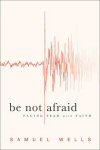
Be Not Afraid
- Author: Samuel Wells
- Publisher: Brazos Press
- Publication Date: 2011
- Pages: 224
Does God heal? Where do I turn when my faith is fragile? How can I face my own death? Is there a gospel for the rich? What am I going to do with my life? In brief, to-the-point chapters, preacher and ethicist Samuel Wells lucidly and compassionately explores topics Christians are often reluctant to face—death, weakness, power, difference, faith, and living life to the full—and offers down-to-earth guidance in facing common fears in the life of faith.“The heart of the gospel speaks into the most numbing and terrifying moments of our lives with words of hope and joy amid fear and bewilderment,” writes Wells. Encouraging readers to look deep into the questions of their lives and deep into the heart of God, this book provides an intellectually rigorous but Scripturally rooted and theologically accessible engagement with questions of faith. Pastors, seminarians, and all who want to know how the gospel can help them overcome common fears will value this work.
Sam Wells has given us good medicine in this book that both diagnoses the fears of our times and offers the remedy of the gospel. In these engaging and wise essays, Wells addresses not only our fear of death but also our fear of life in all its messy complexity. With a deft mix of storytelling, biblical interpretation, and theological reflection, Wells assiduously tells us the truth about the world—a truth we can face because the way beyond fear is not through denial but through patience, hope, and courage. This is a timely and much-needed book for a church tempted to make self-protection more important than discipleship.
—Scott Bader-Saye, Helen and Everett H. Jones Professor of Christian Ethics and Moral Theology, Seminary of the Southwest
A modern-day C. S. Lewis, Sam Wells draws us closer to God's story of eternal love in Be Not Afraid. At times bracing, at other times funny, his words plumb the dark depths of despair and offer hope without triviality, correction without cruelty. This book is a witty, vulnerable, challenging delight, a perfect bedtime companion in dark nights of the soul and a worthy friend when the lights come back on.
—Lillian Daniel, coauthor, This Odd and Wondrous Calling: The Public and Private Lives of Two Ministers
In this book of reflections, Samuel Wells makes profound theological insight and artful language seem effortless. Each essay is a gem, the product of deep thought and the wordsmith's craft. This book is so directly addressed to the reader's heart and mind, so precisely on target about the fears that ensnare us, that Wells comes across not as a distant thinker but as a wise, understanding, and compassionate friend.
—Thomas G. Long, Bandy Professor of Preaching, Candler School of Theology, Emory University
Samuel Wells is vicar of St. Martin-in-the-Fields Anglican Church at Trafalgar Square in London. He previously served as dean of the chapel and research professor of Christian ethics at Duke University. Wells is the author of several books, including Be Not Afraid, Improvisation: The Drama of Christian Ethics, and Transforming Fate into Destiny: The Theological Ethics of Stanley Hauerwas. He also coedited, with Stanley Hauerwas, The Blackwell Companion to Christian Ethics.
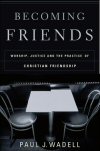
Becoming Friends: Worship, Justice, and the Practice of Christian Friendship
- Author: Paul J. Wadell
- Publisher: Brazos Press
- Publication Date: 2002
- Pages: 186
How do Christians understand friendship and intimacy? How does worship form Christians into a community of the friends of God? What virtues does God call us to incorporate into our lives? In Becoming Friends, Paul Wadell explores the connections between worship, justice, friendship, and the life we are called to live.
This engaging and accessible book offers a fresh viewpoint from which to explore the nature of Christian friendship. Such friendship, Wadell contends, is more than a bonding of people with similar interests, a “ritual of hopeless consolation.” True Christian friendship summons us to love all of our neighbors. Wadell examines obstacles to and characteristics of true friendship and, drawing from the works of Augustine, Aelred of Rievaulx, and other Christian exemplars, contends that we are called to serve God through friendship and that this calling requires us to cultivate certain virtues—especially hope, justice, and forgiveness.
Becoming Friends offers a provocative look into the nature and importance of true Christian friendship. Anyone looking to reflect on the indispensable role of good friendships in the Christian life will find this a hopeful and encouraging book.
Paul J. Wadell is among the most thoughtful and respected interpreters of Christian friendship. This work, like all his previous writing on the subject, is extraordinary for its insight, depth, and creativity.
—Stephen G. Post, professor, Case Western Reserve University
Paul Wadell's Becoming Friends is a work of grace and skill that gently invites us into friendship with God and one another. As he invites us, Wadell also quietly guides us, showing us the virtues and practices we will need if we are to be good friends. Most profoundly, with care and humility, Wadell explores the connection between worship and friendship lying at the very heart of the church. For Christians in all walks, Becoming Friends will provide great help, both in naming what is already rich and good in their lives and churches, and in drawing them nearer in friendship to God and each other.
—Charles R. Pinches, professor, University of Scranton
What a wonderful gift Paul Wadell has given us. In these pages, he enriches our imaginations by showing us both the gift that friendship is and the potentially transformative channel of God's grace that it might become if we were but freed from our culture's superficial and warped views of friendship. Filled with evocative examples and written with Wadell's remarkable blend of eloquence and humility, this is the kind of book that readers will return to again and again.
—Philip D. Kenneson, author, Life on the Vine
Paul J. Wadell is associate professor of religious studies at St. Norbert College, DePere, Wisconsin. His previous works include Friendship and the Moral Life, Friends of God: The Primacy of Love, and Morality.
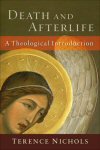
Death and Afterlife: A Theological Introduction
- Author: Terence Nichols
- Publisher: Brazos Press
- Publication Date: 2010
- Pages: 224
What happens to us when we die? Nothingness? Judgment? Heaven? Hell? Many people today fear dying and are uncertain about life after death because of challenges from the sciences, philosophy, and even theology. In this engaging and clearly written book, theologian Terence Nichols addresses contemporary and perennial human questions about death and what lies beyond, making a Christian case for an afterlife with God.
Nichols first examines views of death and the afterlife in Scripture and the Christian Tradition. He takes up scientific and philosophical challenges to the afterlife and considers what we can learn about it from near death experiences. Nichols then argues that the soul can survive death and that bodily resurrection is possible, explores how Christians can be worthy of salvation, and reflects on heaven, purgatory, and hell. He discusses death as a preparation for afterlife, providing readers with a theological guidebook for dying well. This book will benefit professors and students in theology, eschatology, practical theology, and pastoral care courses as well as pastors and priests.
Nichols is to be commended for this outstanding introductory text on death, the afterlife, and resurrection. His book is ambitious in the best senses of that term. It addresses a topic that Christians too often sheepishly neglect or, perhaps worse, speak of in simplistic platitudes and imagery that threaten the credibility of what are in fact intellectually sophisticated Christian beliefs on the life to come. The book is also ambitious in addressing every possible facet of its subject matter, including chapters on ancient Judaism, the New Testament, the Christian tradition, scientific challenges and responses, and even literature on ‘near death experiences.’ Quite evidently a gifted teacher, Nichols treats all of these topics in an accessible manner that is nonetheless clearly nourished by a command of available scholarship on these topics. In nearly every chapter, he presents a fair depiction of the continuum of contemporary positions on the question at hand. The text will be invaluable in university classrooms. Indeed, the book will reward all Christians seeking to better understand Christian belief about the next life, as well as seekers who would benefit from a clear and fair account of Christian belief on this topic in conversation with common contemporary objections from a multitude of disciplines.
—William C. Mattison III, assistant professor of moral theology, The Catholic University of America
As Terry Nichols recognizes in the opening pages of Death and Afterlife, and occasionally throughout, modern theologians tend to avoid the topics in this book. Nichols, however, takes them on with courage and clarity. As a systematic theologian, he rises to the challenge of facing deep human questions and tough contemporary doubts that nag around the edges of our systems of thought, trendy or not. But he does this above all because he is a deeply committed teacher who knows from years of conversation with students that the question of life after death has hardly gone away, if it ever could.
—Gerald W. Schlabach, associate professor of theology, University of St. Thomas
In a world where even some Christians are embarrassed by talk of life after death, Nichols makes a compelling case that the afterlife is integral to understanding how life really is. This book provides the enormously valuable service of digesting a wide variety of scholarship—from theology to neuroscience—and presenting all sides fairly and accurately. The reader encounters not only biblical views of death and afterlife but also startling debates about near death experiences. Nichols provides sound arguments for why traditional Christian views of the afterlife are viable today and gives us ways not only of dying well but also of living well.
—William T. Cavanaugh, professor of theology, University of St. Thomas
Terence Nichols (1941-2014) received his PhD from Marquette University and served as professor of theology at the University of St. Thomas for more than twenty-five years. He also founded and codirected the Muslim-Christian Dialogue Center at the University of St. Thomas. His books include That All May Be One: Hierarchy and Participation in the Church and The Sacred Cosmos: Christian Faith and the Challenge of Naturalism.
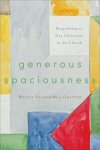
Generous Spaciousness: Responding to Gay Christians in the Church
- Author: Wendy VanderWal-Gritter
- Publisher: Brazos Press
- Publication Date: 2014
- Pages: 288
Committed Christians may respond differently to gay and lesbian Christians. How can we engage those with whom we might disagree and navigate our journey together in a way that nurtures unity, hospitality, humility, and justice?
Through her extensive experience in ministering to gay and lesbian Christians, Wendy VanderWal-Gritter has come to believe we need a new paradigm for how the church engages those in the sexual minority. She encourages generous spaciousness, a hope-filled, relational way forward for those in turmoil regarding a response to gay and lesbian Christians. This book offers a framework for discussing diversity in a gracious way, showing that the church can be a place that welcomes a variety of perspectives on the complex matter of human sexuality. It also offers practical advice for implementing generous spaciousness in churches and organizations.
I can't imagine a more timely book. Modeling the very 'generous spaciousness' that she advocates, VanderWal-Gritter's heart is on every page. The church is at a crucial moment of transition in relation to gay sisters and brothers, and this wonderfully written book will prove to be one of the most helpful guides in the midst of change. Profoundly and deeply biblical, theologically rich, and rooted in years of humble, respectful, and vulnerable listening, VanderWal-Gritter's wisdom is precisely what we so desperately need.
—Brian Walsh, Christian Reformed campus minister, University of Toronto; author, Kicking at the Darkness: Bruce Cockburn and the Christian Imagination
This book provides a model of how people can be agents of reconciliation within Christian communities that are polarized over how to relate to gays and lesbians.
—Tony Campolo, professor, Eastern University
'Loving people changes you,' says Wendy VanderWal-Gritter in this important new book. The author herself clearly has been changed by loving gay people, in a journey that began when she led a ministry in the 'ex-gay' movement. Now Wendy advocates a posture of 'generous spaciousness' and offers pastoral and relational insight from her time at the intersection of homosexuality and the church. This book is highly recommended for anyone who wants to minister in the world (and the church) we actually live in today.
—David Gushee, distinguished university professor of Christian ethics and director, Center for Theology and Public Life, Mercer University
Wendy VanderWal-Gritter has been executive director of New Direction Ministries of Canada in Mississauga, Ontario, for over a decade. She is an internationally recognized contributor to conversations about faith and sexuality and is an active speaker. She is currently completing her doctoral dissertation on the theme of generous spaciousness at Knox College, University of Toronto.

Glittering Vices: A New Look at the Seven Deadly Sins and Their Remedies
- Author: Rebecca Konyndyk DeYoung
- Publisher: Brazos Press
- Publication Date: 2009
- Pages: 208
“Moral formation” and “character development” are popular buzzwords, but they are ineffective concepts without an understanding of what good character is and how to cultivate it. The traditional teachings on the “seven deadly sins”, or capital vices, compiled by saints such as Augustine, Pope Gregory I, and Aquinas, offer a strong foundation for recognizing virtues to cultivate and vices to avoid.
Unfortunately, contemporary culture trivializes, psychologizes, or even dismisses the seven vices as if they have no serious moral or spiritual implications. Glittering Vices clears that misconception with a brief history of the vices and an informative chapter on each “deadly sin.” Readers gain practical understanding of how the vices shape our culture and why gluttony, lust, sloth, and others are, in fact, incredibly destructive. Through this eye-opening book, readers will be able to correctly identify and eliminate the deeply rooted patterns of sin that are work in their lives.
Winsome and wise, Glittering Vices is intriguing for any reader interested in spiritual disciplines and character formation. Its rich content makes it useful in undergraduate and seminary ethics courses as well.
This book is a treat for the mind and a tonic for the soul, recovering and refining riches in the Christian tradition almost lost from view. It is not often that one reads a work that is as intellectually deep and sharp as this one, but which is also intensely practical: helping its readers become the persons they were created to be.
—C. Stephen Evans, professor, Baylor University
Glittering Vices is a lucid, historically informed, and well-illustrated exploration of the seven deadly vices. DeYoung's book will unquestionably help teachers, students, and laypersons toward the Socratic and Christian goal of self-examination. This is an invaluable guide for anyone seeking self-understanding, spiritual growth, and philosophical insight.
—W. Jay Wood, professor, Wheaton College
Rebecca DeYoung here gives us an in-depth, informing, and frequently fascinating look at the vices and why they glitter. For the believer, reading her words will become, in and of itself, an act of spiritual formation.
—Phyllis Tickle, author, Greed
Rebecca Konyndyk DeYoung is associate professor of philosophy at Calvin College in Grand Rapids, Michigan. She wrote the “Seven Deadly Sins” entry for the Encyclopedia of Christianity and collaborated with two of her seminary students to develop a high school/college curriculum on the subject.
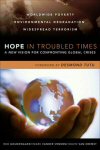
Hope in Troubled Times: A New Vision for Conflicting Global Crisis
- Author: Bob Goudzwaard, Mark Vander Vennen, and David Van Heemst
- Publisher: Baker Academic
- Publication Date: 2007
- Pages: 256
We want to have it all: financial strength, secure homes, clean air and water for our children. With the latest technological advances available, we deserve to have every dilemma resolved. Isn't that the way it's supposed to work? Hope in Troubled Times dares to say “no.”
Poverty, terrorism, and overtaxed land are planetary problems that make even believers despair. But the authors point to Christ as the source of hope. Our choice is obvious. We work together, learning to live unselfishly, or we watch civilization sink further into the abyss. With a foreword by renowned human rights activist Archbishop Desmond Tutu, Hope in Troubled Times provides real-world solutions to life-threatening problems. The authors show that with God's guidance we can knock down the idols that stunt clear thinking.
At a time when so many in our fragile, fractured, and violent world so understandably succumb to despair, rage, indifference, or escapism, this unsettling book issues an audacious manifesto of hope. Fired by a stirring biblical vision of shalom, the authors deploy their ample social science expertise to diagnose the idolatrous obsessions driving our global social, economic, and political crises and blocking their resolution. And they invite all of us—people of faith as well as those who open the book supposing they have none—to take the healing steps that already lie at hand. This book certainly afflicts the comfortable, but only so that the afflicted may indeed be comforted.
—Jonathan Chaplin, director of the Kirby Laing Institute for Christian Ethics, Tyndale House, Cambridge
These authors are spot on. Their words should be read widely!
—Njongonkulu W. H. Ndungane, Anglican archbishop, Cape Town, South Africa
The real struggle of our time is the choice between cynicism and hope. Hope in Troubled Times argues persuasively that the power and possibility of biblical hope offers a resolution to the problems of combating terrorism, global poverty, and environmental degradation. Its analysis and engaging narrative challenge us to find new solutions grounded in that hope rather than in the idolatrous ideologies of our times.
—Jim Wallis, author, God's Politics; editor, Sojourners
Bob Goudzwaard is professor emeritus of economics and social philosophy at the Free University of Amsterdam and a former member of the Dutch Parliament. His many books include Globalization and the Kingdom of God.
Mark Vander Vennen is a writer and social worker living in Ontario, Canada.
David Van Heemst is professor of political science at Olivet Nazarene University and the author of two books.
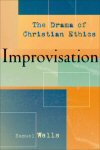
Improvisation: The Drama of Christian Ethics
- Author: Samuel Wells
- Publisher: Brazos Press
- Publication Date: 2004
- Pages: 236
“Improvisation.” We think of jazz—some bebop master following his horn in the genius of the moment. Or theater—an actor striking that authentic note by responding, on the spot, to the lines that came before his. But what does improvisation have to do with ethics
Samuel Wells defines improvisation in the theater as “a practice through which actors seek to develop trust in themselves and one another in order that they may conduct unscripted dramas without fear.” Wells suggests that such a definition is highly appropriate to Christian ethics.
He establishes theatrical improvisation as a model for Christian ethics, a matter of “faithfully improvising on the Christian tradition.” The Bible is not so much a script to rehearse as it is a “training school” that shapes the habits and practices of a community in action. Drawing on Scriptural narratives and church history, he details six practices that characterize both improvisation and Christian ethics—including categories such as “forming habits”,“questioning givens,” and “reincorporating the lost.” He concludes with specific examples of ethical issues, such as facing evil and the perils and promises of genetically-modified food.
Wells's fresh and imaginative discussion reinforces the goal of Christian ethics—not to “help someone act Christianly in a crisis” but to teach Christians to “embody their faith in the practices of discipleship all the time.”
This is one of the most relevant, stimulating and lucid books on Christian ethics to appear for some time. It provides an excellent introduction to current debates in Christian ethics while making its own vivid and sometimes controversial contribution. It is in many places profound and original, and it deserves to be widely read and discussed.
—Duncan B. Forrester, professor, University of Edinburgh
A book on improvisation cannot be a book about improvisation, but it must 'be' that which it is about. No easy task, but both the content and execution of Improvisation do what the book says. With concepts such as 'blocking' and 'overaccepting,' Wells provides us with skills for the imagination that we might live more faithful (and humorous) lives as Christians. Like all great improvisers, Wells has a gift for telling the right but unexpected story at the right time. This extraordinarily sophisticated book can be read for profit by those well schooled in the literature of theology and ethics, but more important, this book will satisfy those who hunger and thirst for an account of what it means to live as a Christian in our day.
—Stanley Hauerwas, professor, Duke Divinity School
Improvisation indeed. Bold, creative, and yet showing a deep mastery of his craft, Samuel Wells charts a fresh course for Christian theological ethics that is at once artful, contemporary, and faithful both to the Bible and to the best of Christian ethical reflection. While Wells rightly refuses to concede that Christian ethics is primarily about problem solving, he nevertheless offers back to the church its own imaginative resources for confronting the more intractable dilemmas of our age. This is a very important book.
—Michael Hanby, professor, Baylor University
Samuel Wells is vicar of St. Martin-in-the-Fields Anglican Church at Trafalgar Square in London. He previously served as dean of the chapel and research professor of Christian ethics at Duke University. Wells is the author of several books, including Be Not Afraid, Improvisation: The Drama of Christian Ethics, and Transforming Fate into Destiny: The Theological Ethics of Stanley Hauerwas. He also coedited, with Stanley Hauerwas, The Blackwell Companion to Christian Ethics.
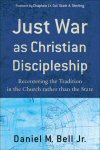
Just War as Christian Discipleship: Recentering the Tradition in the Church rather than the State
- Author: Daniel M. Bell Jr.
- Publisher: Brazos Press
- Publication Date: 2009
- Pages: 268
This provocative and timely primer on the just war tradition connects just war to the concrete practices and challenges of the Christian life. Daniel Bell explains that the point is not simply to know the just war tradition but to live it even in the face of the tremendous stresses and difficulties associated with war.
Just War as Christian Discipleship recovers contexts and specifics of the just war tradition that have been widely forgotten. Instead of seeing the tradition as a checklist to complete that justifies a proposed or ongoing war, Bell looks back to the aspects of the tradition that were about forming, supporting, and holding accountable Christians as just warriors. He shows how just war practice, if it is to be understood as a faithful form of Christian discipleship, must be rooted in and shaped by the fundamental convictions and confessions of the faith. The book includes a foreword by an Army chaplain who has served two tours in Iraq and study questions for group use.
Bell has written a book that I wish I'd had during my deployments. Just War as Christian Discipleship addresses the just war tradition in a way that not only adds to our knowledge of the historical roots of the tradition but also contributes to the Christian soldier's desire to embody the principles as lifestyle. . . . If the Christian community will take seriously Bell's call for a discipleship that embraces the just war tradition, we can all feel more confident that our nation will strive to maintain the moral high ground in its military endeavors and beyond.
—Lt. Col. Scott A. Sterling, chaplain, U.S. Army
By reframing just war as a discipline of Christian discipleship, Bell has breathed new life into the discussion surrounding this important topic. He has done so, moreover, in a manner that makes this book accessible to those well versed in the debates as well as those who are confronting these issues for the first time. We are in his debt.
—Stanley Hauerwas, Gilbert T. Rowe Professor of Theological Ethics, Duke Divinity School
Bell's Just War as Christian Discipleship demands a lot of us. It requires us to submit to a rigorous examination of ourselves, our church, and our nation in exploring how we might act justly before, during, and after war. It offers no excuses for those of us who either avoid any responsibility to ever use force or attempt to rationalize virtually every use of force. Bell advocates for just war as an extraordinarily difficult set of practices grounded in particular Christian theological and ecclesiological presuppositions. In this sense, the book is a prophetic critique of some secular versions of the just war tradition. Even more so, it is a prophetic critique of churches and church leaders for our failure to form communities capable of dealing with the real challenges of just war. Bell also calls for much more consultation between Christian churches and military personnel than is typical so that the churches can be more responsible in their pronouncements and military personnel can hear the churches' claims based upon a Christian understanding of the moral tradition of just war. I commend this book for study by bishops, clergy, and laity as an introduction to a dimension of Christian discipleship that is usually neglected because of our preoccupation with the institutional life of the church.
—Tim W. Whitaker, bishop, United Methodist Church
Daniel M. Bell Jr. is professor of theological ethics at Lutheran Theological Southern Seminary in Columbia, South Carolina. He is an ordained elder in the United Methodist Church and the author of Just War as Christian Discipleship and Liberation Theology after the End of History.
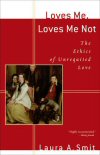
Loves Me, Loves Me Not: The Ethics of Unrequited Love
- Author: Laura A. Smit
- Publisher: Baker Academic
- Publication Date: 2005
- Pages: 266
It hurts when the one you love doesn't love you back. It's hard to be the object of someone's desires when you just don't feel the same way. How should Christians deal with these situations? There are hundreds of books describing how to build lasting relationships or how to lead a chaste life as a single person. There are very few books, however, describing how to deal with unrequited love. With Loves Me, Loves Me Not, Laura Smit fills this void.
Smit tackles this universal human experience with intelligence, sympathy, and wit. An accessible book, Loves Me, Loves Me Not will be an invaluable tool for youth pastors; singles group leaders; college students; and students of human sexuality, marriage and family, and Christian ethics.
Smit brings a chaste heart and a fecund imagination to the topic of romance and relationships. Society tells us that a love not returned is wasted, but Smit shows us just how much we have to learn from unrequited love. She examines the fragments of our love lives with the skill of a pastor and the gentle encouragement of a wise friend, giving us hope that unrequited love can teach us to turn our hearts to God. This is a beautiful book, weaving together personal stories with biblical theology and challenging insight. In a world of sexual experts and sexual excess, perhaps we have the most to learn from someone who is called to be single. Whatever your station in life, this book will move you as much as it will teach you. Read it and begin to love anew.
—Stephen H. Webb, professor of religion and philosophy, Wabash College
Simply smashing! Witty, intricate, and smart—this is the most important, thought-provoking book I have read this year.
—Lauren F. Winner, author, Girl Meets God and Real Sex
Smit presents a superb collection of individuals' experiences with romantic relationships and their beliefs about intimacy. The value of the work is that it shares new, revealing insights for all ages about beautiful, emotional romance—not sexual love—reasoning that romantic love and a moral, godly life are linked constructs. Smit correctly implies that life is a process of maintaining values in the face of a culture that loosens its norms by making love and sex one. This book is a must for any reader who seeks a deep and meaningful love.
—Bob Compton, professor emeritus, Valley Forge Military College
Laura Smit (Ph.D., Boston University) is dean of the chapel and assistant professor of theology at Calvin College. She is ordained in the Presbyterian Church (USA) and the Christian Reformed Church and has served in a variety of pastoral settings.
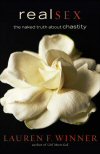
Real Sex: The Naked Truth about Chastity
- Author: Lauren F. Winner
- Publisher: Brazos Press
- Publication Date: 2006
- Pages: 192
SEX. Splashed across magazine covers, billboards, and computer screens-sex is thrilling, necessary, unavoidable. And everybody's doing it, right?
In Real Sex: The Naked Truth about Chastity, Lauren Winner speaks candidly to single Christians about the difficulty—and the importance—of sexual chastity. With nuance and wit, she talks about her own sexual journey. Never dodging tough terms like “confession” and “sin”, she grounds her discussion of chastity first and foremost in scripture. She confronts cultural lies about sex and challenges how we talk about sex in church.
Refusing to slink away from thorny topics, Winner deftly addresses pornography, masturbation, and the perennial question of “how far is too far?” Winner also digs deeper: What does chastity have to do with loving my neighbor? How does my sexual behavior form habits and expectations? With compassion and grit, she calls Christians, both married and single, to pursue chastity as conversion and amendment of life.
Real Sex will be an essential read for single Christians grappling with chastity, for married Christians committed to monogamy, and for those who counsel them. Discussion questions have been added to the paperback edition.
It is unquestionably impossible to write a book about sex that is as exciting as the topic itself. But Lauren Winner comes close. She has written a book of beauty, mystery, stern challenge, and great joy. And she has written it in a humble, honest, literate, elegant voice. I hope it finds many readers.
—John Ortberg, Menlo Park Presbyterian Church
Thank you, Lauren. Now we pastors have a book we can give with confidence to people we serve and lead who have questions about sexuality. It is gentle, firm, honest, candid, reverent, informed, wise, apt, warm, human, and--in the best sense of the word--spiritual.
—Brian McLaren, author of A New Kind of Christian, The Story We Find Ourselves In, and A Generous Orthodoxy
Edgy, smart, hip, gutsy. They are good words in and of themselves, and they certainly describe Lauren Winner's Real Sex. But so too do words like thoughtful, commanding, unflinching, and surgically insightful. Real Sex is far and away the most accessible, best argued, clearest exposition of Christian teaching on sexuality that I have read in years. I commend it to every contemporary Christian regardless of his or her age and stage in life.
—Phyllis Tickle, author of The Divine Hours
Lauren F. Winner is the highly acclaimed author of the memoir Girl Meets God. She is assistant professor of Christian spirituality at Duke Divinity School in Durham, North Carolina, and has written for the New York Times Book Review, the Washington Post Book World, Publishers Weekly, Christianity Today, and Christian Century.
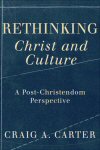
Rethinking Christ and Culture: A Post-Christendom Perspective
- Author: Craig A. Carter
- Publisher: Brazos Press
- Publication Date: 2006
- Pages: 224
Few books have been used as broadly in Christian colleges and seminaries in the past half century as H. Richard Niebuhr's Christ and Culture. His five classic typologies of how Christ can relate to culture—Christ against culture, Christ in “paradox” with culture, and so on—have influenced two generations of Protestant and Catholic thinkers.
But in recent decades scholars have become aware that Niebuhr's typologies need to be rethought in light of changing circumstances. While Niebuhr wrote at a time when it was still possible to speak of Christendom, Christianity since that time has held less and less sway over American and European intellectuals and other shapers of culture. As such, Christianity has found itself increasingly marginalized.
In this work, Craig Carter follows in Niebuhr's footsteps, using typology to explore the crucial question of how Christians should relate to the world. However, he goes beyond Niebuhr to offer an alternative typology that is arguably more deployable in our post-Christian society. This book is a useful text for college and seminary courses and for any Christian who seeks to understand how to share a timeless message in changing times.
H. Richard Niebuhr's days are numbered. Or so one can only imagine. This carefully argued and well-written book should bring the curtains down on the more than 50 year reign of Niebuhr's typology in Christ and Culture. Carter not only shows how this paradigm is inadequate for our world but offers an alternative paradigm that is at once fuller and richer for understanding the church's social existence in the midst of a broken world that is loved by God.
—Mark Thiessen Nation, author,John Howard Yoder: Mennonite Patience, Evangelical Witness, Catholic Convictions
Craig Carter has written an important book for everyone under the influence of H. Richard Niebuhr's Christ and Culture, for everyone committed to the church's witness in the world, and for everyone concerned about the impact of Christianity upon our common life. In our tumultuous times, we should welcome his critique of Niebuhr, heed his call to faithful Christian witness, and emulate his care for our common life.
—Jonathan R. Wilson, author, God So Loved the World
This book is long overdue and much needed. Even though few works of contemporary theology are as influential as Niebuhr's Christ and Culture, there has been surprisingly little serious criticism of its main claims and organizing categories. Carter's stimulating book provides not only a provocative critique of Niebuhr's entire approach, it also breaks new ground by proposing an alternative understanding of the main options for the church's mission to the world. Anyone who reads Niebuhr's classic should also read this book. This book deserves the careful attention of pastors, theologians, and every student of Christian thought and ethics.
—Jeffrey P. Greenman, professor, Wheaton College
Craig A. Carter is associate professor of religious studies at Tyndale University College and Seminary in Toronto, Ontario, and author of The Politics of the Cross.
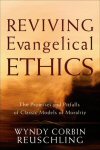
Reviving Evangelical Ethics: The Promises and Pitfalls of Classic Models of Morality
- Author: Wyndy Corbin Reuschling
- Publisher: Brazos Press
- Publication Date: 2008
- Pages: 188
The classic theories of Aristotle, Kant, and Mill have influenced Christian thought in morality and ethics for centuries. But they can go only so far, writes ethicist Wyndy Corbin Reuschling in Reviving Evangelical Ethics: The Promises and Pitfalls of Classic Models of Morality. In this readable book she introduces and overviews the three classic philosophical schools of ethics: virtue, deontology, and teleology.
While the philosophers’ approaches to virtue, duty, and utility have been used widely in forming ethical and moral practices, and are helpful for understanding various dimensions of ethics, Corbin Reuschling argues that they also have limitations from a theological perspective. These theories cannot account for the richness of Christian morality, which involves Scripture, the church, and the development of conscience for increasing skills in moral reflection and ethical deliberation. The author shows how evangelicals wittingly or unwittingly fall into one or another of the classic models without adequate biblical and theological reflection, probes deeply to deconstruct each philosophical approach, and reconstructs a broader, biblically based framework for personal and group ethics. This clear and accessible introductory ethics text will serve college and seminary students well.
This book honors evangelical commitments to the authority of Scripture, to a personal relation with Jesus, and to evangelism. But it challenges some of the ways evangelicals have brought those commitments to bear on Christian ethics, and it suggests better ways, ways that might indeed revive evangelical ethics.
—Allen Verhey, professor, Duke University
Combining appreciation and critique, Wyndy Corbin Reuschling skillfully teases out the particular dynamics at work in the moral thinking of many evangelicals. By carefully analyzing the impact of several moral traditions on evangelicalism, she invites readers into a fuller recognition of the shaping power of scripture and Christian community, and into more robust practices of Christian discipleship. This book is an important contribution to understanding and strengthening evangelical ethics.
—Christine D. Pohl, professor, Asbury Theological Seminary
Reviving Evangelical Ethics offers an appreciative but rigorous critique of the ways that classical moral theory has limited ethics to reflection on the demands of duty, the achievement of certain results, or personal virtue. It is a positive call to obey the fuller moral vision of the Kingdom of God expressed throughout the scriptures and, above all, in the teaching and ministry of Jesus, whose own moral and ethical concerns are often eclipsed by preoccupation with the narrow moral issues thrust to the foreground by evangelical churches' entangling political alliances, or by the battle for individual souls at the expense of a full-bodied engagement with social justice. In this incisive and prophetic book, Corbin Reuschling calls for the deeper development of conscience and moral discernment among Christ-followers through sustained engagement with scripture, intentionally diverse Christian community, and involvement in specific acts of service, all of which help us grow in our awareness of the concerns of those not like us and thus broaden our moral perspective. This important book redefines the boundaries of evangelical ethics in salutarily progressive ways, while raising timely cautions concerning the therapeutic models of spiritual formation that further inhibit the development of the social dimension of Christian ethics.
—David A. deSilva, professor, Ashland Theological Seminary
Wyndy Corbin Reuschling (PhD, Drew University) is professor of ethics and theology at Ashland Theological Seminary. She is the author of Reviving Evangelical Ethics: The Promises and Pitfalls of Classic Models of Morality and has written for publications such as The Journal of the Society of Christian Ethics and Ashland Theological Journal.
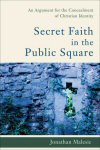
Secret Faith in the Public Square: An Argument for the Concealment of the Christian Faith
- Author: Jonathan Malesic
- Publisher: Brazos Press
- Publication Date: 2009
- Pages: 256
In this groundbreaking and provocative book, Jonathan Malesic examines the tradition and practice of keeping faith separate from public life. Going against the general theological trend of advocating an ever more visible presence for Christianity in American public life, he argues that the best way for Christians to be caretakers of their tradition and to love their neighbors selflessly is to conceal their religious identity in the public square. The alternative—insisting on Christianity’s public visibility in politics, the marketplace, and the workplace—risks severely compromising the distinctiveness of Christian identity.
Delving deep into the Christian tradition, Malesic explains that keeping Christian identity secret means living fully in the world while maintaining Christian language, prayer, and liturgy in reserve. He shows how major thinkers—Cyril of Jerusalem, Søren Kierkegaard, and Dietrich Bonhoeffer—sought to protect Christian identity from being compromised by the public sphere. He then shows that Christians' dual responsibilities for the tradition and for the neighbor must be kept secret.
Against all the arguments that religious conviction should be manifest in public life, Jonathan Malesic offers perhaps the most theologically profound, fruitful, and rigorous challenge: the real truth of Christianity cannot be worn like a flag pin on a politician's lapel. It occurs in secret and in silence. True subjectivity of faith precludes its manifestation in public life, and all attempts to display it in such a way only profane it and further pervert the church as a community of ‘secret disciples.’ This genuinely fresh, freethinking book displays the independence of mind and life for which it argues. Lucidly written and crisply argued, it is a significant contribution to discussions in the field and will be a wonderful counterpoint to the dominant narrative in classes about religion and public life.
—Charles Mathewes, associate professor of religious studies, University of Virginia; editor, Journal of the American Academy of Religion
Using ‘secrecy’ in the positive sense of one who can ‘keep a secret,’ Malesic explores ways in which believers can properly bring the resources of their faith to animate the societies of which they are a part. Reminiscent of the “Letter to Diognetus,” the strategy he proposes would eschew any overt attempts at ‘witness’ precisely to safeguard the integrity of the task entrusted to believers to act as leaven. Yet what of those institutions through which Christians have long sought to leaven the society of which they are a part? Going on to explore how this strategy would apply to them should offer strategies to move beyond the crypto-Christendom he seeks to avoid.
—David Burrell, CSC, professor of ethics and development, Uganda Martyrs University
Malesic's thesis is striking and provocative: we should conceal our faith in order to protect it from being absorbed and prostituted in our voracious secular culture. Readers may not be persuaded, but by the end of the book they will find themselves richly rewarded with many fresh insights into the possibilities for Christian witness in our strange, postmodern era. A truly fresh contribution to the important debate about faith, politics, and culture.
—R. R. Reno, professor of theological ethics, Creighton University
Jonathan Malesic is assistant professor of theology at King's College in Wilkes-Barre, Pennsylvania. He has written several essays for the Chronicle of Higher Education.
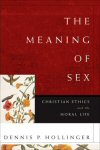
The Meaning of Sex: Christian Ethics and the Moral Life
- Author: Dennis P. Hollinger
- Publisher: Baker Academic
- Publication Date: 2009
- Pages: 272
Our culture is sex-crazed. That is no secret. But our culture is also deeply confused about sex and sexual ethics, often sending conflicting messages—at times promoting an “anything goes” attitude while at other times seeking to impose limits on sexual behavior. Unfortunately, Christians seem equally confused, and the church has tended to respond with simplistic answers. The reason for this confusion is that the meaning of sex has been largely lost.
Dennis Hollinger argues that there is indeed an inherent, God-given meaning to sex. This meaning provides a framework for a biblical sexual ethic that adequately addresses contemporary moral issues. Written primarily as a textbook for Christian college and seminary courses in ethics and human sexuality, The Meaning of Sex provides a good balance between theological reflection and engaging discussion of the practical issues Christians (especially students) are facing. Part 1 lays the groundwork, discussing ethical theories and the competing worldviews that shape various approaches to sexual morality. The Christian worldview of creation, fall, redemption, and consummation is then applied to sex, followed by an exploration of the God-designed purposes for sex. Part 2 delves into critical issues: premarital sex, sex within marriage, homosexuality, reproductive technologies, and faithful living in a sex-obsessed world.
Dennis Hollinger does the world a wonderful service by helping us all to understand the liberating good news of what sex can be. People must still choose whether to embrace this good news. But many are likely never to know about it without reading this book, which in turn will point them to the meaningful counsel of the One who created sex in the first place.
—John F. Kilner, Forman Chair of Ethics and Theology, professor of bioethics and contemporary culture, Trinity International University
Debates and dialogues about sexual ethics spin in circles unless we clarify 'the meaning of sex.' Indeed, what sets apart a truly Christian sexual ethic is that it is founded on the distinctive meanings of sex and sexuality established by God and revealed in the Scriptures. Hollinger's book articulates these foundations persuasively and then mines them to clarify the most pressing ethical and moral challenges facing the church today. This is a wonderful sourcebook for thinking Christians.
—Stanton L. Jones, provost, Wheaton College; author, Ex-Gays? and God's Design for Sex
Dennis Hollinger has put sex in its place. In societies such as ours, in which sex has become both all-consuming and trivial, Hollinger locates the meaning of sex in the context of a Christian worldview that takes seriously the goodness of created bodies and the gift of sexuality along with limitations on what we should do with our bodies and those of others. Hollinger provides a broad and thoroughgoing analysis of various frameworks played out in sexual practices and continually points readers to God's intended purposes for sexual expression in the context of marriage. This book is an important resource that offers us rich theological and moral language to make normative judgments about the expression of human sexuality based on the witness of Scripture, Christian tradition, reason, and experience. Characteristic of Hollinger's pastoral proclivities, he also offers helpful suggestions for churches desiring to help Christians find their way in a 'sex-crazed world.
—Wyndy Corbin Reuschling, associate professor of ethics and theology, Ashland Theological Seminary
Dennis P. Hollinger is president and Colman M. Mockler Distinguished Professor of Christian Ethics at Gordon-Conwell Theological Seminary in South Hamilton, Massachusetts, and is a former pastor. He is the author of numerous articles and the author or series coeditor of several books, including Head, Heart, and Hands: Bringing Together Christian Thought, Passion, and Action.
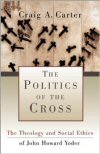
The Politics of the Cross: The Theology and Social Ethics of John Howard Yoder
- Author: Craig A. Carter
- Publisher: Brazos Press
- Publication Date: 2001
- Pages: 256
In this first systematic treatment of John Howard Yoder's extensive writings, Craig Carter argues that Yoder's radical social ethic, centered on pacifism, is derived from a classically orthodox Christianity.
We are in Carter's debt for this carefully researched and thorough study of Yoder's theology and social ethics. The Politics of the Cross has set the standard for excellence for what a theological assessment of Yoder's body of work should be.
—Dr. Michael G. Cartwright, professor, University of Indianapolis
There are no doubt going to be many books in the future published on Yoder, but this will surely be one of the best.
—Stanley Hauerwas, professor, Duke University
Careful, irenic, and argued with intellectual vigour, Carter's study gives a coherent reading of Yoder's Christocentric moral vision which will provoke debate and renewed appreciation for its subject.
—John Webster, professor, University of Oxford
Craig A. Carter is the vice president and academic dean at Tyndale College in Toronto, Ontario, where he also teaches theology and ethics.
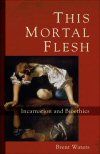
This Mortal Flesh: Incarnation and Bioethics
- Author: Brent Waters
- Publisher: Brazos Press
- Publication Date: 2009
- Pages: 208
We may be entering a golden age in healthcare thanks to dramatic improvements being made in diagnostic procedures and therapies. Many individuals will soon live longer, healthier, and more productive lives. But do these advances also bring the risk of losing one's humanity? Could this progress require the transformation of humans into a new and different species?
In many respects, medicine serves as a surrogate religion in today's societies. Although a proper concern for health is compatible with Christian faith, recent and anticipated advances in extending human longevity are often based on philosophical presuppositions and religious values that are adverse to core Christian beliefs and convictions. In This Mortal Flesh, theologian and ethicist Brent Waters examines the Christian moral life in light of critical bioethical issues, such as biotechnology and physical/cognitive enhancement, reproductive technology, human genetics, embryonic stem cell research, and regenerative medicine. He also examines the “posthuman project,” exploring what it means to be human in light of the denial of mortality. Grounding his theological reflections in the doctrine of the incarnation, Waters argues that it is good to be embodied, finite, and mortal.
This Mortal Flesh represents the distillation of much fine thinking. Brent Waters is concerned less with resolving bioethical dilemmas and more with probing the significance for medicine of the fundamental Christian claim that the Word became flesh. The result is an unusually illuminating display of Christian wisdom concerning technological ambitions that puts in question the meaning of humanity itself.
—John Webster, University of Oxford
Brent Waters is Jerre and Mary Joy Stead Professor of Christian Social Ethics at Garrett-Evangelical Theological Seminary in Evanston, Illinois, where he also directs the Jerre L. and Mary Joy Stead Center for Ethics and Values. He is ordained in the United Church of Christ; has authored, edited, or contributed to many books; and serves on the advisory board of Christian Bioethics.
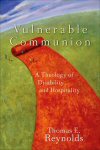
Vulnerable Communion: A Theology of Disability and Hospitality
- Author: Thomas E. Reynolds
- Publisher: Brazos Press
- Publication Date: 2008
- Pages: 256
As parents of a son with disabilities, Thomas Reynolds and his wife know what it's like to be misunderstood by a church community. In Vulnerable Communion, Reynolds draws upon that personal experience and a diverse body of literature to empower churches and individuals to foster deeper hospitality toward persons with disabilities.
Reynolds shows that the Christian story is one of strength coming from weakness, of wholeness emerging from brokenness, and of power in vulnerability. Wholeness, he argues, comes not from self-sufficiency, but from the “genuinely inclusive communion” that results from sharing our humanity—including our lack of ability—with one another. Then, and only then, will we truly live in hospitality with one another and with people with disabilities.
Reynolds offers valuable biblical, theological, and pastoral tools to understand and welcome those with disabilities. The book will be useful to academics, students, and pastors, as well as anyone touched by disability in some way. Readers will find penetrating examinations of the difficult questions of why God allows disability and what the church can learn from people with disabilities.
Vulnerable Communion is subversive theology in the tradition of the prophets speaking from the margins of society. It calls the church to confront and dismantle the (world’s) “cult of normalcy,” within which the church has uncritically worshipped. It also calls for a theology of disability that not merely insists on caring for people with disabilities but that allows the experience of disability to interrogate its theology of power. The result is a long-awaited and much-needed theological revisioning of the traditional doctrines of God, Christ, creation, redemption, and church so that the true power of the gospel is released from the underside of history once again.
—Amos Yong, book review editor, Journal of Religion, Disability and Health; associate research professor of theology, Regent University School of Divinity
Disability is a gift that forces us to rethink what we thought was settled. The worship of a crucified savior in a similar manner forces us to rethink what we thought was settled. It is to Reynolds’s great credit, therefore, that he helps us see how disability and the gospel are inseparably linked just to the extent that they both force us to recognize our vulnerability. It will be a shame if this book is read only by those concerned about disability, because Reynolds’s reflections are crucial for any work in constructive theology.
—Stanley Hauerwas, professor, Duke Divinity School
What we call disability is part of our fragile life and also of life’s mystery in God. To understand disabled people and our own vulnerability and to understand the vulnerable and compassionate God condition each other. This astonishing book serves both sides and is an insightful contribution to an all-embracing theology of life.
—Jürgen Moltmann, professor, University of Tübingen
Thomas E. Reynolds is associate professor of theology at Emmanuel College in the Toronto School of Theology, University of Toronto. He lives in North York, Ontario.
This title is included in the following collections
You can save when you purchase this product as part of a collection.
Baker Academic and Brazos Pres...
$654.99$654.99Baker Ultimate Collection 2022...
$38,273.89$30,599.99